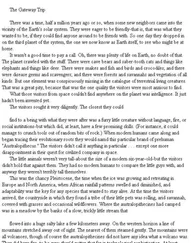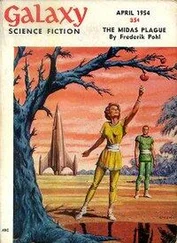Pohl, Frederik - Beyond the Blue Event Horizon
Здесь есть возможность читать онлайн «Pohl, Frederik - Beyond the Blue Event Horizon» весь текст электронной книги совершенно бесплатно (целиком полную версию без сокращений). В некоторых случаях можно слушать аудио, скачать через торрент в формате fb2 и присутствует краткое содержание. Жанр: Старинная литература, на английском языке. Описание произведения, (предисловие) а так же отзывы посетителей доступны на портале библиотеки ЛибКат.
- Название:Beyond the Blue Event Horizon
- Автор:
- Жанр:
- Год:неизвестен
- ISBN:нет данных
- Рейтинг книги:4 / 5. Голосов: 1
-
Избранное:Добавить в избранное
- Отзывы:
-
Ваша оценка:
- 80
- 1
- 2
- 3
- 4
- 5
Beyond the Blue Event Horizon: краткое содержание, описание и аннотация
Предлагаем к чтению аннотацию, описание, краткое содержание или предисловие (зависит от того, что написал сам автор книги «Beyond the Blue Event Horizon»). Если вы не нашли необходимую информацию о книге — напишите в комментариях, мы постараемся отыскать её.
Beyond the Blue Event Horizon — читать онлайн бесплатно полную книгу (весь текст) целиком
Ниже представлен текст книги, разбитый по страницам. Система сохранения места последней прочитанной страницы, позволяет с удобством читать онлайн бесплатно книгу «Beyond the Blue Event Horizon», без необходимости каждый раз заново искать на чём Вы остановились. Поставьте закладку, и сможете в любой момент перейти на страницу, на которой закончили чтение.
Интервал:
Закладка:
The joke of Robin’s birthday book was a little spoiled, because it was not quite true. Some things were known about the Heechee. In some ways it was evident that they were very unlike human beings, but in very significant ways-the same! In curiosity. Only curiosity could have led them to visit so many strange places, so very far apart. In technology. Heechee science was not the same as human, but it rested on the same thermodynamics, the same laws of motion, the same stretch of the mind into tininess and immensity, the nuclear particle and the universe itself. In basic chemistry of the body. They breathed quite similar air. They ate quite compatible food.
What was central to what everyone knew about the Heechee-or hoped, or guessed-was that they were not really, when you came right down to it, all that different from human beings. A few thousand years ahead, maybe, in civilization and science. Maybe not even that much. And in that what everyone guessed (or hoped) was not wrong. Less than eight hundred years passed between the time the first crude Heechee ship ventured to try mass-cancellation as a means of transport and the time when their expeditions had washed over most of the Galaxy. (In Olduvai Gorge, one of Squint’s ancestors puzzled over what to do with the antelope bone his mother had given him.)
Eight hundred years-but what years!
The Heechee exploded. There were a billion of them. Then ten. Then a hundred. They built wheeled and rollered vehicles to conquer the unfamiliar surface of their planet, and in no more than a couple of generations were off into space on rockets; a few generations more, and they were searching the planets of nearby stars. They learned as they went. They deployed instruments of immense size and great subtlety-a neutron star for a gravity detector; an interferometer a light-year across to catch and measure the radio waves from galaxies whose red-shifts approached the limit. The stars they visited and the galaxies they gazed at were almost identical with those seen from Earth-astronomical time does not trouble with a few hundred thousand years-but they saw more keenly and understood more thoroughly.
And what they saw and understood was, at the end, of surpassing importance to them. For Albert’s conjecture was true-nearly true-true in every detail up to the point at which it became terribly false.
As a result of their understanding, the Heechee did what seemed to them best.
They recalled all their far-flung expeditions, tidying behind them to carry away everything that might be useful and could be moved.
They studied some million stars and from those chose a few thousand-some to cast away, because they were dangerous, some to bring together. It was not hard for them to do. The ability to cancel mass or create meant that the forces of gravity were their servants. They selected a population of stable stars and long-lived, winnowed out the dangerous ones, and brought them together, or near enough together to do what they wanted off them. Black holes come in all sizes. A certain concentration of matter in a certain volume of space and gravity wraps it closed. A black hole can be as big as a galaxy, with its component stars hardly closer than in our own. The Heechee’s plans were not so grand. They sought a volume of space a few dozen light-years across, filled it with stars, entered it in their ships. .
And watched it close around them.
From that time on the Heechee were sealed off from the rest of the universe, burrowed into their nest of stars. Time changed for them. Within a black hole the flow of time slows-slows greatly. In the universe outside more than three-quarters of a million years went by. Within, what seemed to Captain no more than a couple of decades. While they were stamping out comfortable nests for themselves in their captured planets (long since hewn into livability; they had had nearly a century in which to work), the mild, gentle Pliocene epoch gave place to the storms and siroccos of the Pleistocene. The Gtinz ice crept down from the north, and retreated; then the Mindel, the Riss, the Worm. The Australopithecines Captain had kidnapped-to help along, perhaps, or at least to study in the hope of finding hope in them-disappeared, a failed experiment. Pithecanthropus appeared, and was gone; Heidelberg man; the Neanderthalers. They crept north and south as the ice directed, inventing tools, learning to bury their dead and ring them with a circle of ibex horns, learning-beginning to learn-to speak. Land bridges sprouted between the continents, and were washed away. Over some of them scared, starving primitive tribes crept, a wave from Asia that ultimately flowed down from Alaska to Cape Horn, another wave that stayed where it was, growing pads of fat around the sinuses to shield its lungs against the stinging Arctic cold. The children that Captain fathered in the warrens of Venus, and kept with him while he and his teams surveyed the Earth and selected the most promising of its primates for acquisition, were not yet fully grown when homo sapiens learned the uses of fire and the wheel.
And time passed.
Each beat of Captain’s twin hearts took half a day in the universe outside. When the Sumerians came down from their mountains to invent the city on the Persian plateau, Captain was invited to participate in the forthcoming anniversary talk. As he prepared his guest list, Sargon built an empire. While he instructed his machines with the program for the meeting small, shivering men hewed blue stone into menhirs to form Stonehenge. Columbus discovered America while Captain was fretful over last-minute cancellations and changes; he finished his evening meal while the first human rockets tottered into orbit and decided to stretch his legs before retiring as a human explorer, wild with surprise, broke into the first Heechee tunnel on Venus. He slept through the time of Robin Broadhead’s growth, puberty, voyage to Gateway and voyages from it, the discovery of the Food Factory, the decision to explore it. He half woke just as the Herter-Hall party was starting its four-year climb to orbit, and went back to sleep-to him it was the equivalent of less than an hour-through all their wearying trip. Captain, after all that, was still relatively young. He had the equivalent of a good ten years of active, energetic life ahead of him-or what the outside universe would see as a quarter of a million years.
The purpose of the anniversary meeting was to review the Heechee decision to retreat to a black hole, and to contemplate what else might need be done.
It was a short meeting. All Heechee meetings were short, when they were not social and prolonged purely for the pleasure they gave; machine-mediated discussions eliminated so much waste that the fate of a world could be settled in minutes.
Settled many things were. There was disquieting news. The F-type star they had, somewhat hesitantly, included in their nest was showing some signs which might indicate ultimate instability. Not soon. But it might be well to consider expelling it from their neighborhood. Some of the news was unhappy but expected. The most recent messenger ship from outside revealed no trace of another spacefaring civilization coming to life. Some of it was expected and discounted in advance. The most rigorous theoretical tests had shown that the theory of oscillating universes was correct; and that, indeed, the Mach’s-Principle hypothesis (they did not call it by that name) which suggested that at an early point in the Big Bang the dimensionless numbers could be changed was valid. Finally, the decision to so situate themselves that time outside passed forty thousand times faster than in their closed-up sphere was reopened for discussion. Was 40,000 to 1 enough of a gain? It could be made more-as much more as anyone could wish-simply by contracting the size of the hole, and perhaps, at the same time, excluding that troublesome F. Studies were ordered. Congratulations were exchanged. The meeting was over.
Читать дальшеИнтервал:
Закладка:
Похожие книги на «Beyond the Blue Event Horizon»
Представляем Вашему вниманию похожие книги на «Beyond the Blue Event Horizon» списком для выбора. Мы отобрали схожую по названию и смыслу литературу в надежде предоставить читателям больше вариантов отыскать новые, интересные, ещё непрочитанные произведения.
Обсуждение, отзывы о книге «Beyond the Blue Event Horizon» и просто собственные мнения читателей. Оставьте ваши комментарии, напишите, что Вы думаете о произведении, его смысле или главных героях. Укажите что конкретно понравилось, а что нет, и почему Вы так считаете.












